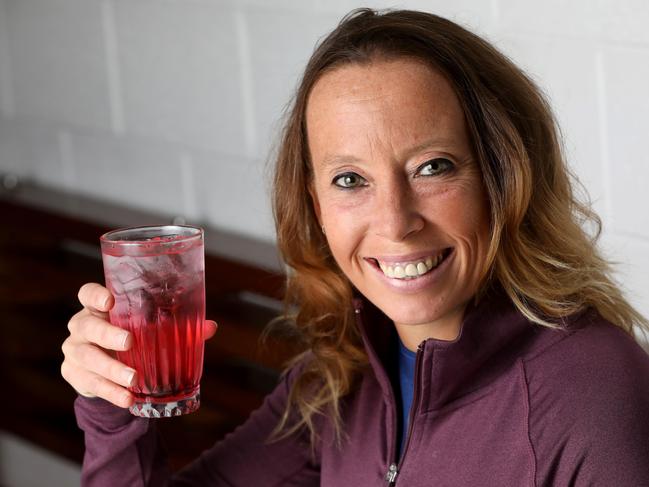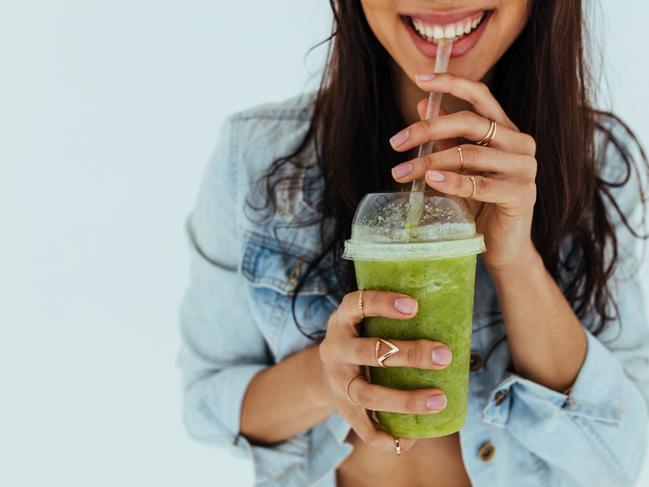A single bottle of these drinks could see you meet or exceed daily sugar limits
They’re sold as the better alternative to soft drinks. But one in two Australians are unaware fruit juices and iced tea contain almost an entire day’s intake of added sugar.
Nutrition
Don't miss out on the headlines from Nutrition. Followed categories will be added to My News.
They’re sold as the healthy alternative to soft drinks but one in two Australians are unaware a single bottle of vitamin water contains almost an entire day’s intake of added sugar.
A new survey has found up to one in three Australians also don’t know flavoured milk, fruit juices, iced teas and sports drinks are loaded with enough added sugars to reach or exceed recommended daily limits.
The warning comes as Australia’s health ministers consider whether to introduce tough new front of pack warning labels on food and drink with high sugar content.

The LiveLighter public education campaign surveyed 2000 Australian adults asking them what they considered a sugary drink.
More than nine in 10 of those surveyed listed soft drinks as sugary drinks but less than half (48 per cent ) named flavoured waters, and a third failed to identify flavoured milk, fruit juice, sports drinks and fruit drinks as containing sugar.

Cancer Council Healthy Lifestyles Campaign Manager Alison McAleese said beverage manufacturers have created a health halo around vitamin drinks promoting them with terms like “focus”, “nutrient” and “smart”.
One of the big problems is these drinks are sold in 500ml containers and this means consumers who drink the whole bottle are consuming up to 29 grams of sugar, nudging the 30 gram or 6 teaspoon ideal daily limit set by the World Health Organisation.
Other sugar-laden beverages like soft drinks, flavoured milks can have so much sugar drinking a single 500ml bottle means you exceed the daily limit.
“People may be shocked to know some of these drinks have as many as 16 teaspoons of sugar. Water is always the best choice and your body will thank you for it in the long run,” LiveLighter and Cancer Council spokesman Steve Pratt said.

Australian Bureau of Statistics surveys have identified sugary drinks as the largest source of added sugar in the diets of Australians.
In many cases these drinks have no nutritional value and amount to empty calories that can promote unhealthy weight gain which can lead to Type 2 diabetes, heart disease and cancer.
LiveLighter is campaigning for changes to food labelling to help people make healthier choices.
Three quarters of Australians support such a change.
“It’s time to give people the information they want and need,” said Mr Pratt.
Health groups also want a sugar tax of 20 per cent to cut consumption of sugary drinks.
In Mexico, consumption of sugary drinks fell 5.5 per cent in the first year after a sugar tax was introduced, this was followed by a 9.7 per cent decline in the second year.

Twenty eight other countries and seven US states have a tax on sugary drinks.
The World Health Organisation recommends ideally we consume only 25 grams or 6 teaspoons of added sugar per day and less than 12 teaspoons. The UK’s Scientific Advisory Committee recommends less than 6 teaspoons a day.
The 2013 Australian Dietary Guidelines recommend limiting intakes of foods and drinks containing added sugars but does not set a limit for intake.
Australian adults consume on average 14 teaspoons a day while teenage boys are gorging on 22 teaspoons every day.
At a recent food forum Australia’s health ministers decided information about sugar provided on food labels did “not provide adequate contextual information to enable consumers to make informed choices in support of dietary guidelines”.
The ministers are examining regulatory options they can take to address the issue.
The Australian Food and grocery Council have put forward a proposal to provide as much transparency as possible about the amounts and sources of added sugars in food and drink products, through both ‘on pack’ and extended labelling through websites which can be readily accessed by consumers through scanning food packs with smart phones.
It says any reforms must establish an effective definition of added sugars and that must be consistent with other labelling schemes, including international schemes, to avoid risk of consumer confusion and misunderstanding.
Sports teacher and personal trainer, Ali Cavill, said she used to buy vitamin waters that were sold as “healthy alternatives.”
“I’ve always loved drinking water but when all the products came on the market, most of the advertisements sounded great, so naturally I bought them,” Ms Cavill said. “But when they revealed the sugar content, I couldn’t believe it.”
- with Adella Beaini
Originally published as A single bottle of these drinks could see you meet or exceed daily sugar limits


